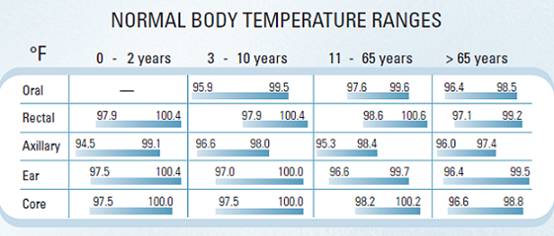Average human body temperature
Body temperature changes throughout the day. It is the lowest in the early morning between 4 and 6 a.m., and the highest in the early evening between 6 and 8 p.m. Normal temperature is about 37°C or 98.6°F. However, it can be as low as 36.1°C (97°F) in the early morning to a high of 37.2°C (99°F) in the evening and still be considered normal. An infant may have a higher than normal temperature if he/she is overdressed. Also, if it is hot outside or if the room is hot, a baby's temperature may rise.
What is normal body temperature?
Body temperature is one of chief indicators of normal functioning and health. Unlike cold blooded animals, human body temperature is held in a narrow range and is automatically controlled to respond to environmental temperature. Internally, all the body functions necessitate maintenance of the proper temperature among other things; thus any serious deviation from the normal body temperature is an indication of ill health. The degree of the deviation also indicates the degree of medical problems. Hence it offers a simple means of monitoring the condition of the patient.
What's the range of normal body temperature?
The range of normal body temperature fluctuation is maintained by a natural automatic regulation, which is termed thermoregulation. It responds to the external temperature conditions or internal metabolism caused by factors like infection. Body temperature above or below normal without any reason is a symptom of underlying medical condition.
Normal human body temperature (its technical term is normothermia) at the core is 98.6°F or 37°C. Of course, there are variations of the temperature on factors the time and place of the measurement. The temperature also varies with babies, children and adults. There are even differences in the normal body temperature based on the geographical location of the person. There is cyclic variation of temperature during sleep-and-wake cycle also. There are notable changes in the temperature when the person is sleepy, hungry or cold. Thus there is no single fixed number that can be considered normal human body temperature.
Factors affecting normal body temperature
Body temperature is measured by liquid thermometers, but nowadays digital electronic temp indicators are very commonly used. It is important to note that there will be difference in temperature obtained at different places in the body. Oral, rectal, core and gut temperatures are all different. Oral measurement shows the lowest temperature. This is also influenced by external factors like breathing with mouth, drinking, smoking, etc. Cold drinks decrease the oral temperature while hot drinks and smoking increase the measured value.
Armpit and ear (tympanic) measurements and other skin based measurements induce errors in measurement. These parts of body do not have fixed correlation with core temperature. It is found that there is a delay of three hours between the core and skin temperature. There are other factors like physical activity and time of the day that show significant differences in the body temperature of even healthy persons.
Age related factors affecting body temperature
Normal body temperature for healthy babies is in the range of 96.8°F to 98.6°F, or 36°C to 37°C. If the baby's body temperature rises above 100.4°F to 101.3°F, then it is considered as indication of fever. If it falls below 96.8°F then the child has low temperature and needs immediate warming up.
For children, the normal body temperature range is between 96.8°F to 98.2°F. It is the same as the range of normal body temperature for adults. If the rectal temperature of children reaches 100.4°F, then it need call for immediate medical attention for fever. On an average, there is a fluctuation of body temperature of 2°F on daily basis.
The normal body temperature for adults is 98.6°F or 37°C under normal condition of no physical activity or excessive ambient temperature conditions. These temperatures are the core body temperature. It is in the normal range if the orally measured temperature of adults is 98.2°F, with fluctuation of 1.3°F higher or lower. If the adult shows oral temperature of more than 99.5°F, then it is considered as fever or some other medical conditions.
In elderly people, the temperature is lower. Around 1°F than younger adults.
Talking of different gender, adult women have slightly higher normal body temperature than adult men. It is also observed subtle fluctuations among individuals. Since the proper measurement of body temperature gives a simple but accurate tool to diagnose body health conditions, keeping a customized normal body temperature range record is helpful to forsee some potential health risks.
